Health Expert Warned Australians to prepare for a triple virus surge this winter
An alarming spike in influenza has hit Australia ahead of winter, with thousands of cases and a sharp rise in deaths. But it’s not the only virus surge to prepare for.
May 28, 2025
Experts are warning of a triple virus surge this winter, with COVID-19, influenza, and RSV already spreading rapidly - and say the best protection is to get vaccinated before the end of May.
'We're dealing with an early wave of a significantly infectious virus diseases,' Professor Paul Griffin said on Wednesday.
'When one person brings something home, it can sweep through the whole household in days.
'The more we empower families to detect illness early, the better we can manage outbreaks and protect those most at risk.'
There have been more than 80,000 confirmed influenza cases in Australia so far this year up to May 22, a more than 50 per cent jump from the same period last year.
Seasonal flu is a common and highly contagious respiratory infection usually caused by influenza A or B viruses, but there are multiple subtypes and strains.
Meanwhile so-called COVID cases are expected to skyrocket this winter with a contagious strain of the Omicron variant to infect a large percentage of Australians.
Variant LP.8.1. was identified as the main culprit of large outbreaks overseas in late 2024 and early 2025 and was responsible for three in five Covid cases in the UK in March.
While the strain does not appear to cause worse symptoms than its predecessors, recent testing found it could be more contagious.
Infectious Disease Physician, Professor Paul Griffin said households need to test for viruses including influenza, RSV and Covid-19 (stock image)
Doctors urge Aussies to stay up to date on COVID and flu vaccines as winter illnesses rise (stock image of Aussies wearing masks during the COVID pandemic)
Professor of epidemiology at Deakin University Catherine Bennett urged Aussies to remain up to date on their so-called Covid vaccines, particularly the elderly and people with weakened immune systems.
'Any variant can be a real problem for them, that's why it's advised for people with underlying health conditions or aged over 65 to have a pre-winter dose,' she said.
'It takes a couple of weeks to get the benefit of a vaccine and while it might only protect you for a couple of months, that's as long as the waves usually last.
'Getting it in May will keep you covered. Don't wait until the cases are already rising. You know, give yourself a couple of weeks' notice.'
She warned a combination of factors created the conditions for an explosion in the number of cases.
'Our immunity is waning - it's been a while since most people have had a suspected Covid infection and fewer people are getting boosters now,' she previously told Daily Mail Australia.
'As we go into winter, more people will be gathering indoors together which helps the virus spread. That's why all that respiratory virus transmission goes up in winter.
'This [Covid] variant has been in Australia since July last year, but we were coming out of winter, we'd gone through the worst of the wave and most people had a recent infection or booster dose.'
Last year, the number of Australian's getting vaccinated decreased by 5.8 per cent in all States and Territories.
Professor Griffin said the most effective way Australians can protect themselves from the virus outbreak is by using rapid antigen tests to help stop the spread of influenza and other viruses within households.
'Infants, elderly adults, pregnant women, and people with chronic conditions face the highest risk of serious complications, including pneumonia, dehydration, or hospitalisation,' Professor Paul Griffin said.
'Recognising symptoms like high fever, fatigue, wheezing, or difficulty breathing early ensures families can take swift action - whether that means starting antivirals, isolating, or seeking urgent medical care.
'Early testing is not just a personal benefit, but a broader public health strategy.'
Last year, the number of Australian's getting vaccinated decreased by 5.8 per cent in all states and territories.
So-called COVID-19 and flu vaccinations are free for everyone in Australia, including those without a Medicare card.
More than a third (31,955) of flu cases have been registered in New South Wales (stock image)
So far this year, more than a third (31,995) of flu cases have occurred in NSW, according to the Australian government's dashboard.
The second highest number of cases is in Queensland (18,818), followed by Victoria with 17,618 flu cases.
Western Australia has registered 6510, while laboratories have found 4719 in South Australia, 1557 in Northern Territory, 1126 in Tasmania and 1099 in ACT.
New data shows a 65.7 per cent jump in influenza deaths in 2024 compared to the previous year, with elevated numbers continuing into early 2025, according to the Australian Bureau of Statistics (ABS).
There were 16 influenza deaths recorded in January this year alone, and almost 10 times that in suspected Covid-related deaths.
ABS figures show that both January and February this year recorded more flu deaths than the same period in most previous years, sparking fears of an early and potentially severe influenza season.
Traditionally, flu activity in Australia peaks during the winter months.
However, this year’s early onset more closely resembles patterns seen in the Northern Hemisphere, including Japan, the UK, and China.
“Coming into the start of this year, so the summer in Australia, coming into autumn, we’ve actually got increased levels of influenza activity in Australia, which sort of correlates with increased activity in the Northern Hemisphere as well.”
Influenza A and B viruses are responsible for most seasonal flu outbreaks, but each year sees a different mix of subtypes, making the virus difficult to predict and control.
This year’s influenza vaccines have been updated to better target current strains, particularly the H3N2 subtype.
“The H3N2 component is kind of the problem child of the influenza vaccines,” Professor Reading said.
“It’s the one that needs updating the most to keep up with the mutations that occur in the virus as it circulates around the world.”
He also warned that influenza won’t be the only virus circulating this winter. Suspected COVID-19, RSV, norovirus, and strains of avian influenza such as H5N1 are also being closely monitored.
“In 2024, we had the first human case of H5N1 was recorded in Australia from a return traveler from India,” he said.
“That virus was detected and characterized here at our collaborating centre.”
While the avian influenza strain has raised international concern, including a significant outbreak in U.S. dairy herds, there is currently no indication of it spreading between humans.
“The virus is secreted into the milk,” Professor Reading said.
“At the moment, there have been 70 recorded human cases in the US. One death, but no evidence of person-to-person spread, which is really important.”
Professor Julie Leask, a social scientist with the University of Sydney’s Infectious Diseases Institute, said Australia’s flu vaccination rates remain alarmingly low.
“Our influenza vaccination rates in Australia are dire and they’re not improving,” Professor Leask said.
She noted that many serious outcomes could be avoided with better uptake of the vaccine.
“The vaccine isn’t perfect, but it’s much better than zero, which is what you’re looking at if you don’t have a vaccine.”
According to new research from the 2025 National Vaccination Insights Project, which surveyed over 2000 adults in March, nearly one-third of Australians haven’t had a flu shot in the past two years.
Infectious diseases physician Dr Paul Griffin said the flu continues to take a heavy toll each year.
“We know that there are deaths in the order of thousands, hospitalizations around 20,000 every year,” Dr Griffin said.
“It’s not just a flu, it’s a very severe viral infection in its own right and can be life threatening.”
In Australia, the National Immunization Program provides free flu shots to several groups, including young children, pregnant women, adults 65 and older, Aboriginal and Torres Strait Islander people, and individuals with certain medical conditions.
TUZARA POST reporting from Canberra via Courier Mail Australia contributed to this report.
Share or comment on this article.
Your support is crucial in exposing fake news and in helping us defeat mass censorship.

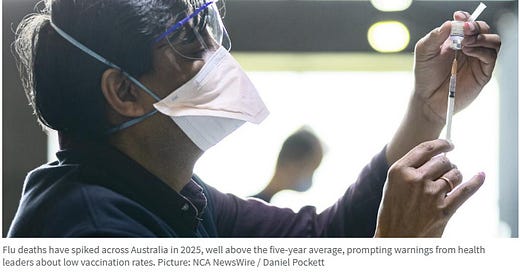




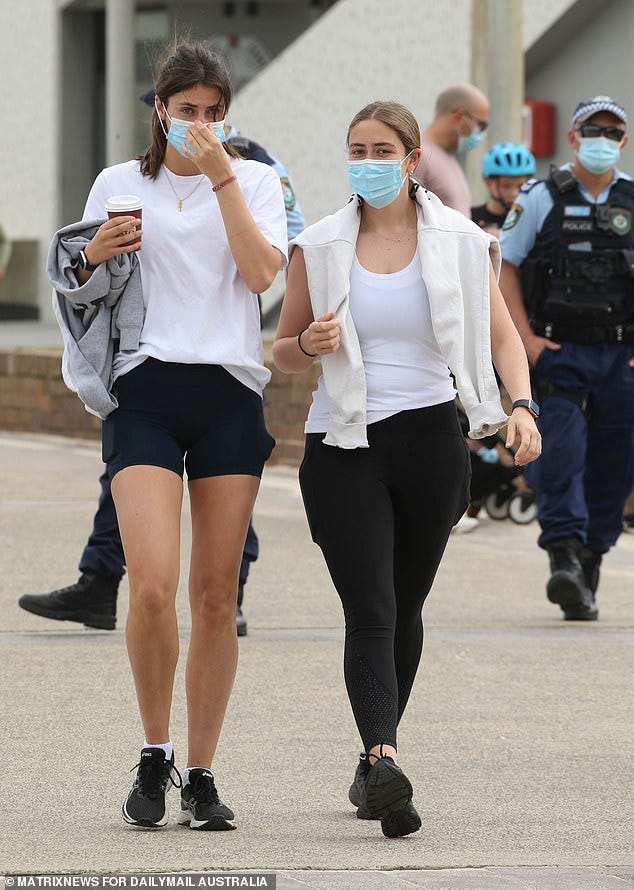
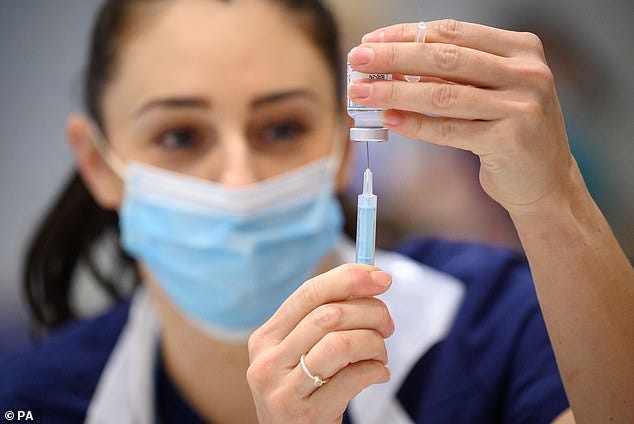
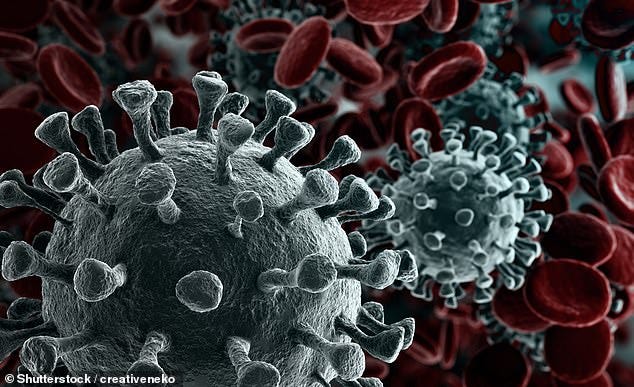
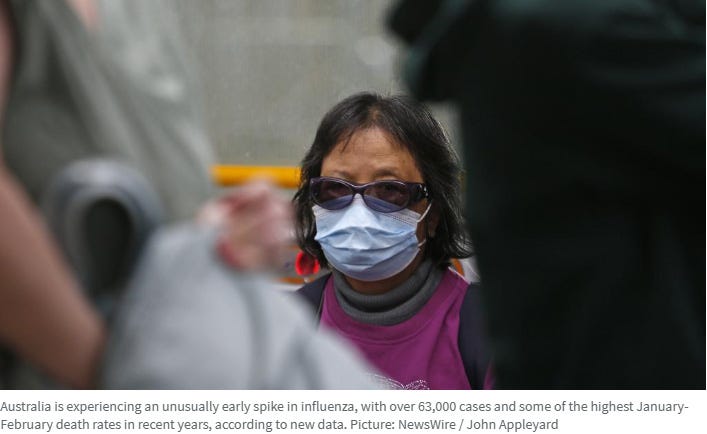
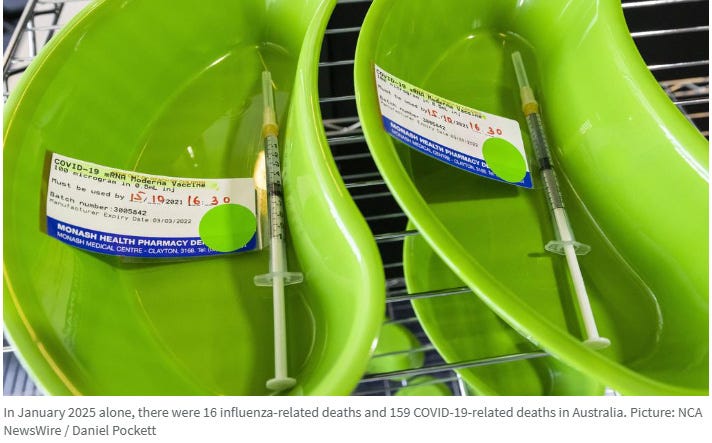
The "vaccine" is poison. Plain and simple. Any doctors who say that it is better than nothing ought to be arrested.
Don't trust Big Pharmaceutical Companies either!